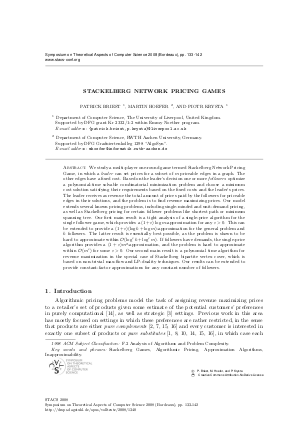Stackelberg Network Pricing Games
Authors Patrick Briest, Martin Hoefer, Piotr Krysta
-
Part of:
Volume:
25th International Symposium on Theoretical Aspects of Computer Science (STACS 2008)
Part of: Series: Leibniz International Proceedings in Informatics (LIPIcs)
Part of: Conference: Symposium on Theoretical Aspects of Computer Science (STACS) - License:
 Creative Commons Attribution-NoDerivs 3.0 Unported license
Creative Commons Attribution-NoDerivs 3.0 Unported license
- Publication Date: 2008-02-06
File

PDF
LIPIcs.STACS.2008.1340.pdf
- Filesize: 203 kB
- 12 pages
Document Identifiers
Subject Classification
Keywords
- Stackelberg Games
- Algorithmic Pricing
- Approximation Algorithms
- Inapproximability.
Metrics
- Access Statistics
-
Total Accesses (updated on a weekly basis)
0Document
0Metadata
Abstract
We study a multi-player one-round game termed Stackelberg Network
Pricing Game, in which a leader can set prices for a subset of $m$
priceable edges in a graph. The other edges have a fixed cost.
Based on the leader's decision one or more followers optimize a
polynomial-time solvable combinatorial minimization problem and
choose a minimum cost solution satisfying their requirements based
on the fixed costs and the leader's prices. The leader receives as
revenue the total amount of prices paid by the followers for
priceable edges in their solutions, and the problem is to find
revenue maximizing prices. Our model extends several known pricing
problems, including single-minded and unit-demand pricing, as well
as Stackelberg pricing for certain follower problems like shortest
path or minimum spanning tree. Our first main result is a tight
analysis of a single-price algorithm for the single follower game,
which provides a $(1+varepsilon) log m$-approximation for any
$varepsilon >0$. This can be extended to provide a
$(1+varepsilon )(log k + log m)$-approximation for the general
problem and $k$ followers. The latter result is essentially best
possible, as the problem is shown to be hard to approximate within
$mathcal{O(log^varepsilon k + log^varepsilon m)$. If
followers have demands, the single-price algorithm provides a
$(1+varepsilon )m^2$-approximation, and the problem is hard to
approximate within $mathcal{O(m^varepsilon)$ for some
$varepsilon >0$. Our second main result is a polynomial time
algorithm for revenue maximization in the special case of
Stackelberg bipartite vertex cover, which is based on non-trivial
max-flow and LP-duality techniques. Our results can be extended to
provide constant-factor approximations for any constant number of
followers.
Cite As Get BibTex
Patrick Briest, Martin Hoefer, and Piotr Krysta. Stackelberg Network Pricing Games. In 25th International Symposium on Theoretical Aspects of Computer Science. Leibniz International Proceedings in Informatics (LIPIcs), Volume 1, pp. 133-142, Schloss Dagstuhl – Leibniz-Zentrum für Informatik (2008)
https://doi.org/10.4230/LIPIcs.STACS.2008.1340
BibTex
@InProceedings{briest_et_al:LIPIcs.STACS.2008.1340,
author = {Briest, Patrick and Hoefer, Martin and Krysta, Piotr},
title = {{Stackelberg Network Pricing Games}},
booktitle = {25th International Symposium on Theoretical Aspects of Computer Science},
pages = {133--142},
series = {Leibniz International Proceedings in Informatics (LIPIcs)},
ISBN = {978-3-939897-06-4},
ISSN = {1868-8969},
year = {2008},
volume = {1},
editor = {Albers, Susanne and Weil, Pascal},
publisher = {Schloss Dagstuhl -- Leibniz-Zentrum f{\"u}r Informatik},
address = {Dagstuhl, Germany},
URL = {https://drops.dagstuhl.de/entities/document/10.4230/LIPIcs.STACS.2008.1340},
URN = {urn:nbn:de:0030-drops-13406},
doi = {10.4230/LIPIcs.STACS.2008.1340},
annote = {Keywords: Stackelberg Games, Algorithmic Pricing, Approximation Algorithms, Inapproximability.}
}
